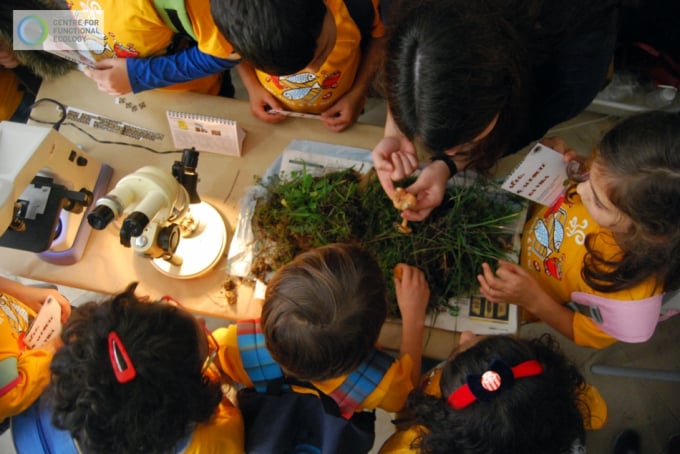May 16, 2025 | 10:44 GMT +7
May 16, 2025 | 10:44 GMT +7
Hotline: 0913.378.918
May 16, 2025 | 10:44 GMT +7
Hotline: 0913.378.918

On World Soil Day, children are engaged in the conversation on protecting soils and soil biodiversity.
Did you know that the equivalent of one soccer pitch of soil erodes every five seconds? Yet it takes 1 000 years to produce just a few centimetres of topsoil.
Soil is the life support of our food and agriculture. We rely on soils for 95 percent of the food we consume. Yet on this course, by 2050, 90 percent of all soils are set to be degraded. Without change, degrading soils will put our ecosystems, our climate and food security in jeopardy.
FAO’s Global Soil Partnership (GSP) has been working for the past decade with countries and over 500 partners to address soil-related issues, positioning soil on the Global Agenda. The GSP continues to create an ever-growing network of partners to promote sustainable soil management and soil governance globally.
Here are just five of the achievements of FAO’s GSP in stopping soil degradation and improving soil management:
The GSP partners with countries to reach farmers and improve soil management on the ground.
One programme, Recarbonization of Global Agricultural Soils (RECSOIL), addresses challenges related to climate change and sustainability by boosting soil health and making them more productive and shock resilient. The mechanism focuses on the recarbonization of soils, or improving the amount of organic matter in soil, by adopting practices such as using cover crops, crop rotation and agroforestry, among others. This boosts the health of soils and in turn, increases food security and farmers’ incomes. The RECSOIL programme addresses both carbon sequestration and mitigation of greenhouse gases (GHG).
Costa Rica and Mexico are currently piloting RECSOIL by incentivizing farmers to adopt sustainable soil management. Farmers are trained on good practices while their fields are monitored to assess soil health and the provision of ecosystem services.
The GSP has produced cutting-edge products and services, such as digital soil mapping, that illustrate soil conditions so that countries and national institutions can boost their own capacities and make informed decisions to manage soil degradation.
Following a country-driven approach, the GSP and countries have produced four global maps so far, all created to target certain soil threats. These informative tools include the Global Salt-affected Soils Map, Global Soil Organic Carbon Sequestration Potential Map, Global Soil Organic Carbon Map and Global Black Soil Distribution Map. These maps rely on ground data from around the world and support evidence-based decisions for sustainable soil management at all levels.
With its global capacity development programmes, the GSP delivers on-the-job trainings and provides countries with guidelines and technical support. To date, the GSP has reached over 7 000 national experts from more than 170 countries. Training sessions bridge the digital gap and improve national capacities on soil data management, mapping, modelling and soil analysis, among other topics.
One of the seven technical networks that GSP facilitates is the Global Soil Laboratory Network (GLOSOLAN) which was established in 2017. It builds the capacities of laboratories to produce reliable data on soils by harmonizing methods, units and information on soil analysis. GLOSOLAN integrates rapid and cost-effective systems to measure soil properties through its initiative on soil spectroscopy. Today, more than 850 laboratories from 152 countries are active members of this Network.
Through campaigns such as the International Year of Soils and World Soil Day on 5 December, the GSP has raised awareness of soils and increased global participation and support. In addition, the Partnership has engaged billions of citizens in conversation through social media as well as provided informative tools such as factsheets and infographics.
Raising awareness from an early age is also of utmost importance. In 2020, the GSP launched a Children’s Book Contest on Soil Biodiversity to engage a young audience on the importance of soil organisms and the urgency to protect soil biodiversity. The contest received a total of 80 books from over 60 countries. The top 10 story entries were published in a collection called The Magical World of Soil Biodiversity.
The GSP works with governments to shape inclusive policies and improve soil governance. It also enhances the capacity of policy makers to implement sustainable soil management for future generations.
The role of the GSP has been vital in developing normative tools to assist countries to mainstream soil health and sustainable soil management into national legislation, strategies and programmes. These documents include the Revised World Soil Charter, the Voluntary Guidelines for Sustainable Soil Management and the International Code of Conduct for the Sustainable Use and Management of Fertilizers. These documents not only help to shape global policies but also streamline sustainable soil management at all levels and, in the process, make possible extensive consultations within the international soil community.
Soils are now high on the global agenda, and it is imperative to pursue sustainable soil management practices. The Global Soil Partnership is leading the mission for better soil management and raised awareness of soil-related issues, but we all have a role to play! Make it your objective to discover more about the birthplace of our food: soils!
(Fao.org)

(VAN) Fourth most important food crop in peril as Latin America and Caribbean suffer from slow-onset climate disaster.

(VAN) Shifting market dynamics and the noise around new legislation has propelled Trouw Nutrition’s research around early life nutrition in poultry. Today, it continues to be a key area of research.

(VAN) India is concerned about its food security and the livelihoods of its farmers if more US food imports are allowed.

(VAN) FAO's Director-General emphasises the need to work together to transform agrifood systems.

(VAN) Europe is facing its worst outbreak of foot-and-mouth since the start of the century.

(VAN) The central authorities, in early April, released a 10-year plan for rural vitalization.

(VAN) Viterra marked a significant milestone in its carbon measurement program in Argentina, called Ígaris, reaching 1 million soybean hectares measured.